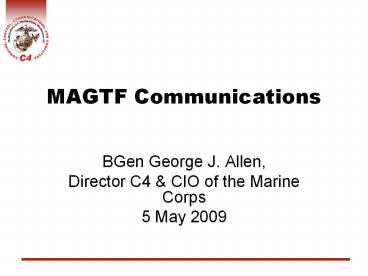MAGTF Communications - PowerPoint PPT Presentation
1 / 8
Title:
MAGTF Communications
Description:
Ku/Ka. BLOS. Potential mobile enhancements: STEP/Teleport ... strike, intelligence collection, electronic attack, data networking, and communications relay. ... – PowerPoint PPT presentation
Number of Views:157
Avg rating:3.0/5.0
Title: MAGTF Communications
1
MAGTF Communications
- BGen George J. Allen,
- Director C4 CIO of the Marine Corps
- 5 May 2009
2
Selected MAGTF Implications
- Expeditionary Headquarters
- Enhanced intelligence systems
- Persistent surveillance over an extended but
densely complex operational environment - Advanced ISR sensors linked to users at all
echelons - Integrated C2 ISR capabilities down to the
squad level - MAGTF communications infrastructure must be
resilient and protected from cyber attack - Improved fires and maneuver capabilities
- Coordinated, precise fires from ground, air, and
naval surface fire support platforms - Must rapidly and precisely engage fleeting
targets - Unmanned aircraft systems (UASs)
- provide force-multiplying capabilities, fostering
transformational advancements in battlespace
command and situational awareness - Develop Aviation C2 systems - fuse C2, sensor,
weapons data, and information to provide a true
COP
2
from MCVS 2025
3
Principle Force Implications
- Fully enable decentralized MAGTF operations
- Organize and train for disaggregated MAGTF ops
- C2 ISR to the lowest tactical level
- Discriminate and responsive fires
- Enhance tactical mobility all domains
- Protected ground maneuver
- Significantly lighten the combat load
- Increase effectiveness in the Information
Environment - Information Operations 7th warfighting function
- Roles functions and responsibilities
institutional support - Cultural terrain
3
from MCVS 2025
4
Networking the Future MAGTF
- Network focused on decision
- Integrates essential technologies into a single
system focused on the ground warfighter - Migrate to a fully net-enabled, distributed and
democratized environment where capabilities and
information are available to any node at any time - Support machine-to-machine communication
- Each node collaborates as customer, provider, or
both - Scalable and upgradeable
- Open architecture, IP based, and using standard
protocols
Taken from AVN/APW brief
5
Potential mobile enhancements
2014 GCE
EHF
- NCW Modem
Ku/Ka
STEP/Teleport
- PoP (2014)
C/X/Ku/Ka
L-Band BFT
- PoP-C Command Vehicle
2-8 Mbps FDMA
4 Mbps TDMA
- Networking Radio LOS Upgrades
NCW/JIPM
- Network Capable Radio (NCR)
- Integrated Airborne Tier
DIV / RGMT
NCR
BN/SQN
Microwave
BLOS
6
2014
HNW Highband Networking Waveform SRW Soldier
Radio Waveform WNW Wideband Networking Waveform
NCW
MAGTF
NCW
NCW
High Bandwidth Backbone (Voice, Video, Data)
WNW
NCW
High Bandwidth Subnets (Voice, Video, Data)
WNW
HNW
HNW
SRW
SRW
SRW
Low Bandwidth Subnets (Voice, C2/SA Data)
7
Aerial Layer
- Connecting Marines
- RF/Voice first, then networking
- Mobile comms/C2
- Extending the tactical network
- Networked radios
- Battlespace video/ISR
- Enabling sensor-to-shooter communications
8
Excerpts from the Marine UAS Plan
- Unmanned aircraft systems (UAS) enable Marines to
increase the effectiveness of our air-ground team
and will continue to widen and add depth to
our aviation support by capitalizing on current
and future technologies. Future UAS will expand
to provide support in other Marine Aviation
functions beyond aerial reconnaissance. - Concepts
- Battalion level-units will use the smaller Tier I
systems as an organic reconnaissance and
surveillance capability. The VMU squadrons will
employ the larger and more-complex Tier II and
III systems via a common Ground Control Station
(GCS) to provide task-organized support to
various MAGTFs. Greater capability will be
resident in the Tier III system, and it will
include such support as targeting, strike,
intelligence collection, electronic attack, data
networking, and communications relay.
- Capabilities
- Command and control is currently being augmented
through a radio relay capability with our Shadow
UAS. The development and addition of systems such
as CORPORAL will increase access to command data
networks.
from AVPLAN 2009































